Lhe United States said on Wednesday it was “disappointed” with the indirect negotiations with Iran on nuclear power that began on Tuesday in Doha, where “no progress has been made” according to Washington, which considers this round of exchanges “completed”. . The American envoy for Iran, Robert Malley, and the Iranian negotiator Ali Bagheri had opened Tuesday in the Qatari capital indirect talks through the intermediary of the European Union (EU), with a view to unblocking the negotiations in Vienna on Iran’s nuclear. The talks in Austria opened in April 2021 are intended to reintegrate the United States into the Iran nuclear deal reached in 2015 and bring Iran back to full compliance with its commitments dictated by this pact.
“The indirect talks in Doha have come to an end and we are disappointed that Iran has, once again, refused to respond positively to the EU initiative, and therefore no progress has been made,” he said. Wednesday evening a spokesman for the US State Department. “Iran has raised points that have no connection with the JCPOA (English acronym for the 2015 agreement, editor’s note) and does not seem ready to make the fundamental decision of whether they want to revive the agreement or bury it,” he added.
READ ALSOIran closer than ever to the bomb
Earlier, Enrique Mora, the EU coordinator, had indicated that there was “not yet the progress hoped for” by his team in the discussions. Iran had however estimated during the day that an agreement with the United States was possible, but underlined that the negotiations were to be completed on Wednesday evening, two days after their launch. “We are serious” in our desire to reach an agreement, Iranian Foreign Minister Hossein Amir-Abdollahian said during his visit to Turkmenistan, according to comments reported on Wednesday by the official Irna news agency.
Remote message exchanges
The two sworn enemies, who have not had diplomatic relations since 1980, exchange indirectly. They send each other messages – each staying in their place – to try to break the impasse in which the attempts to revive the 2015 agreement find themselves. This agreement, which eased the sanctions against Iran in exchange for limitation of its nuclear program, was unilaterally abandoned by former US President Donald Trump in 2018. International talks to revive the agreement began under the aegis of the EU in April 2021 in Vienna, before the process bogged down in March 2022.
READ ALSOEmmanuel Macron or the diplomacy of the coup
The administration of Joe Biden says it wants to return to the agreement if Tehran renews its commitments, but Iran is demanding the lifting of sanctions as well as guarantees that Washington will no longer withdraw from the pact. The initial optimism aroused by the talks in Doha had translated into a sharp appreciation of the Iranian currency on the black market on Wednesday, according to money changers in the countries. Global tensions in the oil market are also an opportunity for Iran to push for the lifting of sanctions on Iranian crude, according to Alex Vatanka, director of the Iran program at the Washington-based Middle East Institute think tank. .
